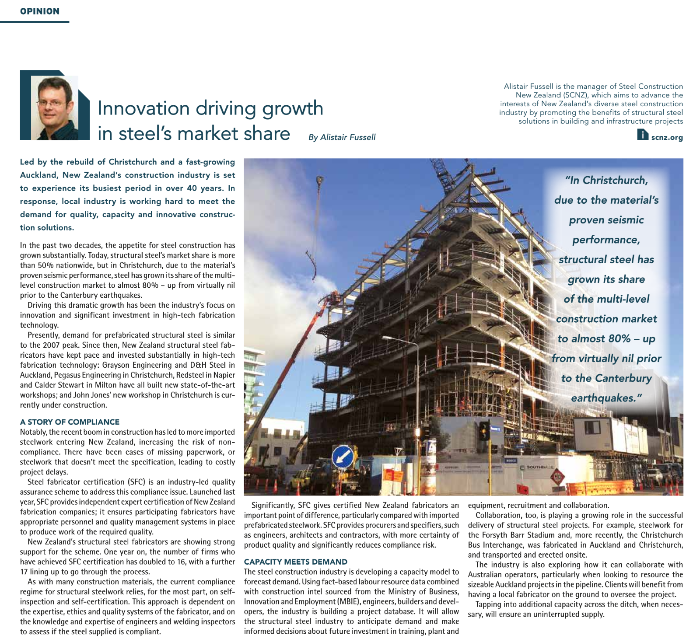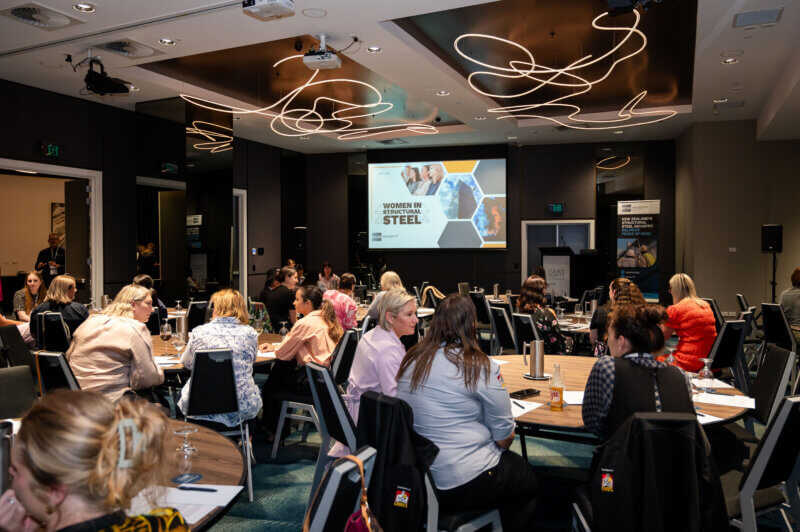By Alistair Fussell, Manager, Steel Construction New Zealand
Led by the rebuild of Christchurch and a fast-growing Auckland, New Zealand’s construction industry is set to experience its busiest period in over 40 years. In response, local industry is working hard to meet the demand for quality, capacity and innovative construction solutions.
In the past two decades, the appetite for steel construction has grown substantially. Today, structural steel’s market share is more than 50% nationwide; in Christchurch, due to the material’s proven seismic performance, steel has grown its share of the multi-level construction market to almost 80%, up from virtually nil prior to the Canterbury earthquakes.Driving this dramatic growth has been the industry’s focus on innovation and significant investment in high-tech fabrication technology.
Presently, demand for prefabricated structural steel is similar to the 2007 peak. Since then, New Zealand structural steel fabricators have kept pace and invested substantially in high-tech fabrication technology: Grayson Engineering and D&H Steel in Auckland, Pegasus Engineering in Christchurch, Redsteel in Napier and Calder Stewart in Milton, have all built new state-of-the-art workshops; and John Jones’ new workshop in Christchurch is currently under construction.
A story of compliance
Notably, the recent boom in construction has led to more imported steelwork entering New Zealand, increasing the risk of non-compliance. There have been cases of missing paperwork or steelwork that doesn’t meet the specification, leading to costly project delays.
Steel Fabricator Certification (SFC) is an industry-led quality assurance scheme to address this compliance issue. Launched last year, SFC provides independent expert certification of New Zealand fabrication companies; it ensures participating fabricators have appropriate personnel and quality management systems in place to produce work of the required quality.
New Zealand’s structural steel fabricators are showing strong support for the scheme. One year on, the number of firms who have achieved SFC certification has doubled to 16, with a further 17 lining up to go through the process.
As with many construction materials, the current compliance regime for structural steelwork relies, for the most part, on self-inspection and self-certification. This approach is dependent on the expertise, ethics and quality systems of the fabricator, and on the knowledge and expertise of engineers and welding inspectors to assess if the steel supplied is compliant.
Significantly, SFC gives certified New Zealand fabricators an important point of difference, particularly compared with imported prefabricated steelwork. SFC provides procurers and specifiers, such as engineers, architects and contractors, with more certainty of product quality and significantly reduces compliance risk.
Capacity meets demand
The steel construction industry is developing a capacity model to forecast demand. Using fact-based labour resource data combined with construction intel sourced from MBIE, engineers, builders and developers, the industry is building a project database. It will allow the structural steel industry to anticipate demand and make informed decisions about future investment in training, plant and equipment, recruitment and collaboration.
Collaboration, too, is playing a growing role in the successful delivery of structural steel projects. For example, steelwork for the Forsyth Bar Stadium and, more recently, the Christchurch Bus Interchange, was fabricated in Auckland and Christchurch, and transported and erected on site.
The industry is also exploring how it can collaborate with Australian operators, particularly when looking to resource the sizeable Auckland projects in the pipeline. Clients will benefit from having a local fabricator on the ground to oversee the project. Tapping into additional capacity across the Ditch, when necessary, will ensure an uninterrupted supply.








